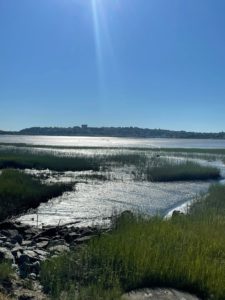
The majestic Back Cove Trail in Portland, ME.
In my book “Adventures in Local Politics” I write about the power of transformational leadership.I’m talking about the kind of leadership that makes an enduring difference, the kind that transcends petty politics, personality conflicts and feuds that serve no one.
That kind of leadership is rare these days.
But needed now more than ever and in every walk of life—government, academia, health care, business, education and the non-profit world.We know these types of leaders when they arrive. They make us feel safe, cared for and excited about the future. They are inspirational visionaries but they are also about getting things done. Ideas are great, but implementation is what really counts. You have to get things done.
The importance of transformational leadership hit me recently on a long walk on the Back Cove Trail in Portland, Maine.The trail is 3.25 miles long around a picturesque lake brimming with breathtaking views. It’s a simple concept really. Just a trail around a large body of water.But the trail delivers so much more than a dirt path…. the trail speaks to a vision and it embodies the values of a city and it’s long ago mayor—James Phinney Baxter.
The trail and a ring of connecting parks was the brainchild of Mayor Baxter who envisioned an “emerald necklace” around his city. The Back Cove Trail connects to other open spaces including the magnificent Evergreen Cemetery which is on the National Register of Historic Places and is a wonderful place to soak up history amidst statuary that forces you to slow down and learn about the lives of those who came before us.
Across from the cemetery sits Mayor Baxter Woods, with its mighty white ash trees, shaded vistas and cool pines. The land was gifted to Portland by Mayor Baxter who was quite wealthy in addition to being civic minded which brings us back to the Back Cove Trail.
Mayor Baxter had a vision for a walking trail and public access around the lake and that required private landowners dedicating some property to make it happen.In 1894, Mayor Baxter took Portland City Council members to Boston’s Back Bay Fens to see the restoration efforts by the landscape architects Olmsted, Olmsted, and Eliot.He said, “We may see …what Boston has done in transforming similar vile places into beauty spots.”Baxter hired the Olmsted firm to create a plan but there was opposition.There’s always opposition.But Mayor Baxter pushed ahead.
He convinced landowners to donate a 100 foot strip of land along the shore. Opponents weren’t impressed. They thought the plan was overly extravagant. This isn’t surprising, there are always people who fight ambition and vision. If they are in charge, they can choke the life out of a place. It’s one thing to discuss design, it’s another to say “don’t do anything, we’re done.”
Friends, we are never done. The future is always watching and waiting. Good leaders, the ones who make a difference, serve the present and try to serve the future as well. They strive to do big and important things. Bad leaders (an oxymoron) get caught up in the nonsense. They major in the minor. Mayor Baxter was not that kind of guy.
More often than not, transformational leaders pay a price. They are OK with that because they believe in their vision.
Baxter lost his bid for re-election and his plan was stalled until he was re-elected. After 23 years, yes 23 years, Back Cove Boulevard opened in 1917 with Baxter riding in the first car along his dream vista. The road was eventually renamed Baxter Boulevard.
Today, it’s a showstopper enjoyed by more than 350,000 walkers, runners and bicyclists a year. In a word, it’s stunning and provides value beyond anything we can measure. After all, how do you measure vision? Beauty? Access to the magic of nature?
What’s important to note was that Mayor Baxter was willing to risk his seat for an important idea. How many politicians are willing to do that?
It’s also important to note that he was later restored to office. I wonder if it’s because voters came around and saw the wisdom in his “emerald” vision.
Today, because of that big idea, thousands benefit by using that trail to exercise, sightsee and get inspiration for paintings, photographs and in my case—to write this blog.I’ve seen a few transformational leaders in my time— people whose courage, ability and work ethic enable them to do enduring things.
Locally, I think former Mayor Tom Lynch qualifies, so does Mayor David Schmidt and I was always impressed with what Mayor Nancy Graham did for West Palm Beach.Frances Bourque, who founded Old School Square, qualifies and so do Chiefs Kerry Koen and Rick Overman whose leadership left lasting marks on our fire and police departments.Lynn University President Kevin Ross and Boca Lead founder Bill Mitchell are two other leaders who have transformed their parts of the world. There are more and we’ll get to them in future blogs but you get the idea.
My book encourages transformational thinking because it’s the only kind of thinking that moves the needle and we need to move the needle. Everywhere you look there are needs and opportunities.I work with a transformational business leader and I’ve witnessed first hand what than can mean for people and industries.Carl DeSantis founded Rexall Sundown back in the day and he and his team (he always shares credit) transformed the vitamin and nutrition space.Then he discovered a small beverage company on 4th Avenue in downtown Delray that recently received a $550 million investment from Pepsi that made headlines all over the world.Carl’s steadfast belief in Celsius enabled the success that has transformed the energy drink space and created a whole lot of shareholder wealth.
Sometimes visions get derailed—for good or temporarily.
Mayor Woods was defeated, came back and completed his vision of an emerald necklace.
Right now, Frances Bourque and those who love Old School Square are wandering the desert waiting for good leadership to return to Delray Beach. But guess what, her vision endures. Those buildings were saved and they will benefit this community once again. So dream big my friends. Support those who have a positive vision.We owe it to the future. Because sometimes–if we are fortunate and if we insist on making the world better— those visions endure.

The emerald necklace endures.


